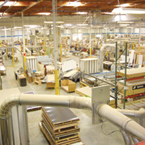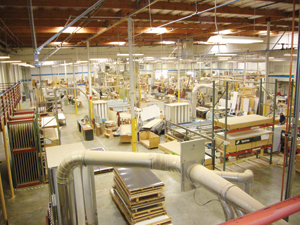
Heartwood Installs, a three-year-old Marlton, NJ, woodwork installer, launched an Amazon.com e-commerce site this summer to sell woodworking power and hand tools, saw blades and fasteners.
While owner Jannelle Ande credits advances in these tools with helping her company meet “tighter deadlines and complete tasks on-site that once had to be performed in the shop,” the e-store also creates a modest revenue stream. And it does something even more important — raises awareness of Heartwood Installs among prospects who care enough about woodwork to want to buy tools.
Andes says clients often commented on the tools Heartwood installers used on location. Staff continuously review them to find “the best tools” to install architectural millwork, commercial casework, doors, hardware and residential cabinetry.
Heartwood Install’s e-commerce marketing is just one example of creative approaches to business operations that custom woodworking firms have adopted in recent months to survive one of the worst downturns ever.
In some cases, unique approaches are financially driven. In Milwaukee, four woodworking firms combined at a single plant location, a suggestion of investor group Ubela Holdings, which holds a stake in each, to see if they could share resources.
One of the four, Diamond Cut, is a traditional custom cabinetry and woodworking firm. Now rebranded as Diamond Woodworks, it shares a 53,000-square-foot plant with Ubela’s other wood manufacturing holdings: Green Tree Designs, which makes trade show exhibits; retail display manufacturer CIS Corp.; and Hope Shelter, which manufacturers temporary housing for victims of natural disasters.
The Milwaukee plant will start with about 25 workers, with a target of 40 by mid-2012. Ubela Inc. acquired Diamond Woodworks from James Hoffman Builders as part of its strategy to merge like-minded complementary companies to share intellectual capital, resources and clients.
Another funding approach used by a number of woodworking firms is called KickStarter.com. iBamboo, Brooklyn, NY, makes a natural wood amplifier that boosts the sound for iPhone4s. The company went to KickStarter.com, which uses an approach known as “crowd funding.” iBamboo inventor Anatoliy Omelchenko gathered a total $19,000 in small sums from dozens of private investors, enough to get launched.
 KickStarter gathers small investments from private individuals who contribute online to form a business funding pool. Iwantproof.com, an Ontario, Canada, manufacturer of lacewood, ebony, zebrawood and bamboo wood-framed sunglasses, used the site to raise $15,000 to develop and launch a new line. Robert Campbell, “The Joiner’s Apprentice,” used KickStarter to fund tool purchases for his woodworking projects. “My dream is to build historically accurate woodcraft items for you, using exclusively hand-powered tools and traditional techniques,” Campbell says in his listing. He received over $5,900 in funding.
KickStarter gathers small investments from private individuals who contribute online to form a business funding pool. Iwantproof.com, an Ontario, Canada, manufacturer of lacewood, ebony, zebrawood and bamboo wood-framed sunglasses, used the site to raise $15,000 to develop and launch a new line. Robert Campbell, “The Joiner’s Apprentice,” used KickStarter to fund tool purchases for his woodworking projects. “My dream is to build historically accurate woodcraft items for you, using exclusively hand-powered tools and traditional techniques,” Campbell says in his listing. He received over $5,900 in funding.
Downsizing, Outsourcing
Pipe organ orders are on the wane today. The Associated Pipe Organ Builders of America lists just 27 builder members on its website. In June, master wooden pipe organ builders Wicks Organ Company downsized, auctioning off its building, along with excess inventory and equipment, and shifted staff to independent contractor status.
Cabinetmaking firm Bucks County Furniture, Ltd., liquidated its in-house cabinetry and furnishing production equipment this summer as it moves to a new business model. “We are sub-contracting everything,” says owner Rick Miller. The company will use its well-honed expertise in project management. Relying on outside contractors it will continue to deliver everything from custom kitchen cabinets, bath vanities and library built-ins to reproductions of 17th and 18th century New England, Pennsylvania German and Shaker Reproduction furniture by hand with hand tools and top quality woods.
Bypassing the Recession
In Western New York State, Rochester Custom Millwork reports a five-year annual growth rate of 35%. Listed as No. 44 in Fortune Magazine’s Inner City 100 list of the fastest growing inner city businesses in the United States, Rochester Custom Millwork reported 2009 revenues of $1.7 million. Under CEO Lesley Jarbe, Rochester Custom Millwork designs, builds and installs custom architectural woodwork and cabinetry for commercial, professional and residential clients.
On the other side of the country, Morgan Hill, CA, custom woodworking and casegoods firm Mission Bell Manufacturing says it has seen its business grow despite the general slowdown in construction. Mission Bell saw revenues rise from $22.9 million in 2009 to $27 million in 2010. CEO Clint Ramsey (shown on the cover of this issue) projected more growth for 2011.
Mission Bell, which serves high end institutional and fast-track Silicon Valley clients, moved into its current 103,000 square foot, highly automated production facility in August 2007. Mission Bell says it is known for both its custom woodwork and high production plastic laminate casework and countertops. It also has experience working in projects geared to earn LEED credits, and carefully integrates its project planning and design applications with other construction contractors, smoothing the installation process.
Insourcing Woodwork
OneSource Development, Phoenix, AZ, expanded its services, adding cabinetry and millwork in-house as an extension to general remodeling and construction.
“Many customers, whether they are redesigning their kitchens or building out a commercial location can get frustrated working with a volume of vendors, designers, material sourcing companies, and architects,” says Brandan Millan, co-founder and owner. “The fact we are able to design, layout, provide 3-D renderings, consult on material choices and fabricate granite or cabinetry in-house not only saves our customers money, but time.”
OneSource Development says it uses unconventional streamlining of the communication and construction process with its “One Source, One Stop” process including in-house designers, granite fabrication and in-house millwork. The company opened a 6,000-square-foot shop in April. Past projects of the OneSource Development team include thousands of residential homes as well as Subway franchises, grocery stores, coffee shops, multiple restaurants and large office complexes.
Celano Construction in nearby Mesa, AZ, likewise moved into wood cabinetry, launching its first cabinet line, Baltic Duck made of birch plywood. Owner Peter Celano says he was inspired to design and create the new cabinet line following 17 years of installing and repairing cabinets. Baltic Duck Cabinets use 1/2-inch Baltic birch plywood in place of traditional particleboard for cabinet construction. The plywood is coated with what Celano describes as an “eco-friendly, water-resistant finish.” Doors and face frames are made from the customer’s choice of alder, cherry, hickory, maple and oak.
Moving the woodshop in-house hasn’t worked for everyone. This summer Merlino, an Elk Grove Village, IL, construction company, sold off the saws, shapers, jointers, moulders and planers in its woodshop. The 20-year-old Merino was founded as a residential construction company, then moved into commercial woodworking projects. Its woodshop is now closed.
Retooling the Plant
MarketCraft, a Newberg, OR, manufacturer of wood and mixed-material store displays, signage and custom interior components, began production earlier this year on the first U.S. Cojet heavy-duty industrial inkjet printer.
Opened in January 2011, MarketCraft does most of its volume in retail store fixtures for national brands such as Intel, Calloway, and footwear firm Keen. It also fashions complete retail interiors: Currently it is manufacturing and will install the complete interior signage and display fixtures for three New Seasons Market stores, a local grocery chain.
Company president John Johnson says the Anderson Cojet inkjet printer was selected to fulfill MarketCraft’s business model of single-source production of retail store fixtures. The Cojet, which uses a five-color Konica inkjet head printing at 720 dots per inch resolution, eliminates the need for outsourcing screen printing.
At Grove llc, wood case popularity for smart phones and touch pad computers is likely to set even more cutting tools in motion as buzz circulates of an imminent iPhone5 release. Wood case quality is defined by the precision of the crafting, says Grove’s Ken Tomita, featured in September 2011 CWB. His Portland, OR, firm has been churning out iPhone 4 and iPad 2 cases. A former custom furniture and cabinetmaker at Tomita Design, Ken launched his firm with his brother Joe late last year after two years of development.
While the launch of a new iPhone starts consumers queuing up days in advance at Apple stores, Grove begins tooling work weeks ahead of time, following the online rumor mill as it adapts projected case design to what is expected to arrive on store shelves. The iPhone 5 is expected this month.
These and many other custom woodworking businesses are covered at woodworkingnetwork.com. Next issue, we’ll feature Mission Bell Manufacturing.






Have something to say? Share your thoughts with us in the comments below.